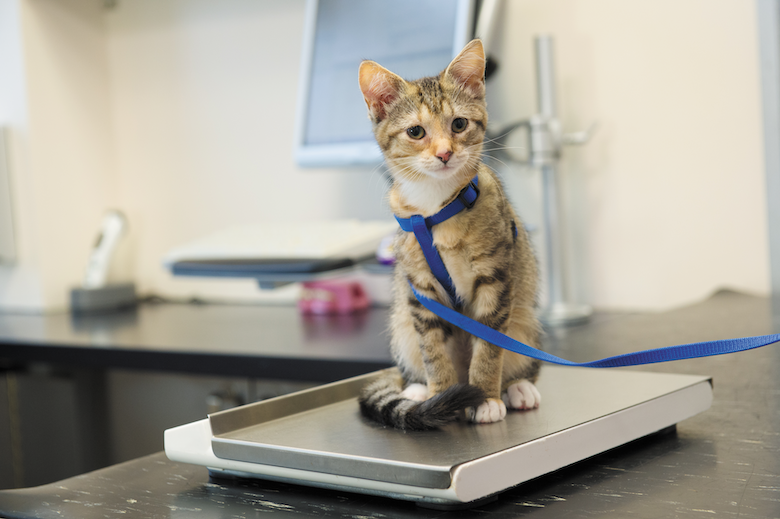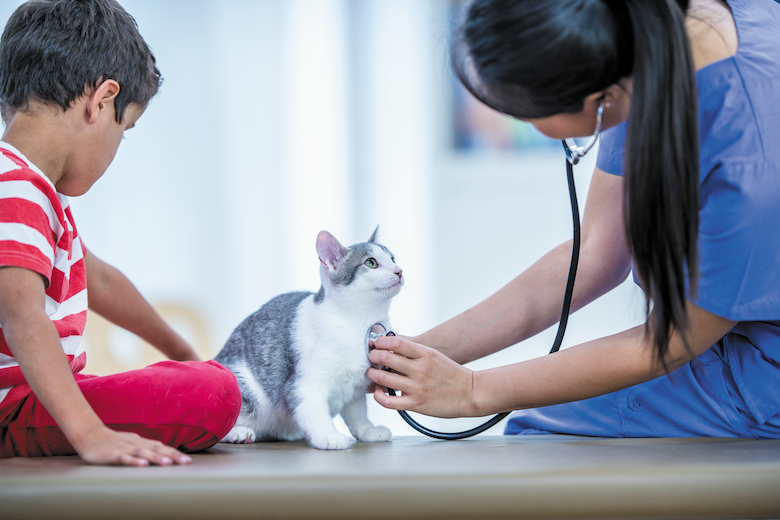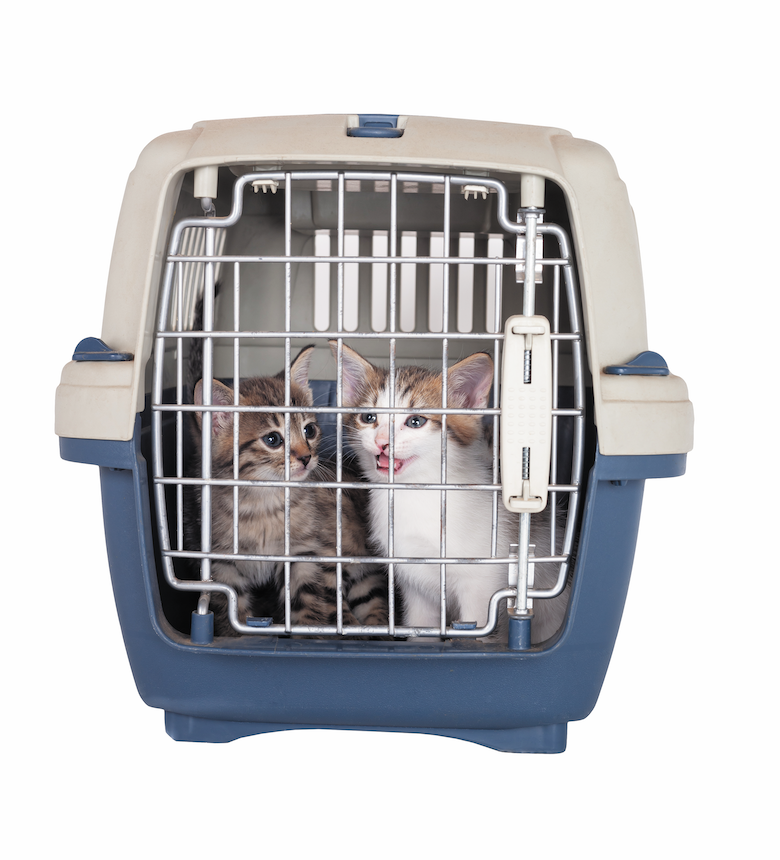The post How to Prepare Your Kitten for the Vet by Marissa Heflin appeared first on Catster. Copying over entire articles infringes on copyright laws. You may not be aware of it, but all of these articles were assigned, contracted and paid for, so they aren't considered public domain. However, we appreciate that you like the article and would love it if you continued sharing just the first paragraph of an article, then linking out to the rest of the piece on Catster.com.
There’s nothing like having a small ball of fluff curled up on your lap, purring in delight because you’ve given her a forever home. You’ve thought of everything for your new kitten: a cozy bed (or two), food and water bowls to sit atop a stylish place mat, cat food, a sturdy carrier, top-of-the-line toys, a litter box fit for royalty, grooming essentials and a scratching post that will (hopefully) provide many hours of delight. That should cover it, right? Almost. While it’s certainly an extensive shopping list, there’s one thing missing: an appointment with your veterinarian.
Related: 6 Tips for Choosing the Right Veterinarian for Your Cat
“Most kittens are full of energy and excitement,” wrote licensed veterinary technician Laura Lee Muller on Cat Friendly Homes, a website created by the American Association of Feline Practitioners (AAFP). “Don’t let their energy distract you from keeping them healthy. Your kitten needs a thorough physical exam and protection from preventable diseases by receiving appropriate vaccines. Ideally, the first visit to the veterinarian should happen within the first week you bring your kitten home. If you have other cats in your household, your new kitten should be tested by your veterinarian before coming into your home.”

Photo: vonneW | Getty Images/
How to prepare your kitten for the vet
Your kitten’s first visit to the vet may include diagnostic tests, deworming and vaccinations. The frequency in which kittens should receive vaccinations is based on set guidelines, such as those put forth by the AAFP’s Feline Vaccination Advisory Panel.
“Based on guidelines, kittens should generally go to the veterinarian [for vaccination] between 6 and 8 weeks of age,” says Dr. Bruce Kornreich, director of the Cornell Feline Health Center at Cornell University College of Veterinary Medicine. “Vaccines are usually given about every two to four weeks until the cat is 4 months of age, although some veterinarians may spread it out to 5 months of age.”
Vaccines fall into two categories, core and non-core. Core vaccines are those that are recommended for all cats, such as feline panleukopenia virus (FPV), feline herpesvirus 1 (FHV-1), feline calicivirus (FCV) and rabies. Non-core vaccines are considered discretionary, meaning that they are administered on a case-by-case basis. These vaccines include feline immunodeficiency virus (FIV) and feline leukemia virus (FeLV), among others. While FeLV is considered a non-core vaccine, the AAFP highly recommends this vaccination for all kittens.
Deworming treats internal parasites, such as tapeworms, hookworms and roundworms. Roundworms are the most common intestinal parasite of cats, affecting 25% to 75% of cats, with higher rates in kittens, according to the Cornell Feline Health Center. Kittens often acquire roundworms from their mother.
“Some veterinarians will empirically deworm cats,” Dr. Kornreich says. “At minimum, a stool sample should be done [to check for internal parasites].”
Kittens can also be susceptible to ectoparasites, like fleas, ear mites and ticks. “It’s very important that cat owners follow product guidelines regarding how ectoparasite products are used,” Dr.
Kornreich says. “Some products are not intended to be given to young cats, and it’s really important that they don’t use dog products on cats.”

Photo: FatCamera | Getty Images
Keep a watchful eye
If your kitten is experiencing lethargy, discharge from the eyes or nose, diarrhea, poor appetite, vomiting, hair loss, increased vocalization, failure to thrive, low temperature and/or coughing, contact your veterinarian. These are signs that your kitten may be sick.
Dandruff, scaly or crusty skin, circular areas of hair loss, inflamed areas of the skin and excessive grooming and scratching may point to ringworm. It’s among the most frequently occurring skin disorder affecting cats, according to the Cornell Feline Health Center. Ringworm is actually a fungal infection, having nothing to do with worms. While ringworm is treatable, be aware that it is a zoonotic disease, meaning that it can be passed from an infected cat to a human who comes in contact with it.
Respiratory infections can be quite common in cats, according to the Cornell Feline Health Center. These infections are caused by a variety of viruses, bacteria, fungi and protozoa.
Symptoms of upper respiratory tract infections include clear or colored discharge from the eyes or nose, coughing, sneezing, conjunctivitis, lethargy, ulcers in the mouth and anorexia. In some rare cases, according to the center, cats may have trouble breathing. Your veterinarian will be able to pinpoint the cause of symptoms and appropriate treatment.
Once your cat hits her first birthday, continue with wellness checks once a year, then twice a year when your cat turns 10, Dr. Kornreich says.
“The earlier a problem is diagnosed, the earlier intervention can be implemented,” Dr. Kornreich says. “In most cases, there will be a better outcome.”

Photo: www.africaphotobank.com | Getty Images
Here are some of the top medical issues kittens may face
While this list is by no means exhaustive, it gives a glimpse into a few conditions that some kittens may encounter.
Feline Infectious Peritonitis (FIP)
What it is: A viral disease caused by a mutation of a common coronavirus that only affects animals. Any cat that carries coronavirus is potentially at risk for developing FIP. However, cats with weak immune systems, such as kittens, are most likely to develop FIP. It’s not a highly contagious disease, but it is almost always fatal.
What to look out for: There are two major forms of FIP: a “wet” form characterized by an accumulation of fluid in the abdomen and a “dry” form presenting symptoms such as chronic weight loss, anemia, depression and fever.
“Generally, any cat that is less than 2 years in age that develops a fever, is nonresponsive to antibiotics and begins to accumulate fluid, FIP should be high on the list,” says Dr. Kornreich.
Good to know: The majority of cats that get coronavirus do not develop FIP, according to Dr. Kornreich. There’s no approved treatment for FIP, but some drugs are showing promise in clinical trials.
Feline Panleukopenia
What it is: A highly contagious viral disease caused by feline parvovirus. It often has a high mortality rate. Kittens are particularly susceptible.
What to look out for: Fever, vomiting, diarrhea, loss of appetite and leukopenia (reduced number of white blood cells).
Good to know: Vaccination is generally effective for controlling the disease.
Cerebellar Hypoplasia
What it is: Abnormal development of the cerebellum, the part of the brain responsible for muscle coordination. In utero or early neonatal infection with feline panleukopenia can cause cerebellar hypoplasia. It’s a lifelong condition with no cure.
What to look out for: Lack of coordination, head bobbing, unusual locomotion.
Good to know: “Cats with cerebellar hypoplasia can actually live happy lives if they’re managed and the husbandry is such that it minimizes risk,” Dr. Kornreich says. “The cat’s movements can be jerky and disconcerting to owners, but we know that cats can live a healthy life otherwise.”
Featured Image: ilona75 | Getty Image
The post How to Prepare Your Kitten for the Vet by Marissa Heflin appeared first on Catster. Copying over entire articles infringes on copyright laws. You may not be aware of it, but all of these articles were assigned, contracted and paid for, so they aren't considered public domain. However, we appreciate that you like the article and would love it if you continued sharing just the first paragraph of an article, then linking out to the rest of the piece on Catster.com.
Marissa Heflin